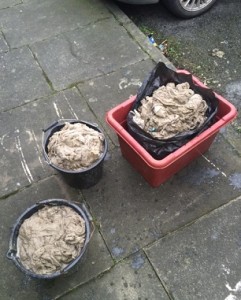‘You need to bin it not flush it’ – NI Water
What really lurks in our sewers? The answer in the Newcastle and Mourne region is everything from nappies, to cotton buds, baby wipes and other inappropriate items, according to NI Water.
 Each year, NI Water retrieves millions of waste items from the sewerage network that simply shouldn’t be there – some of the more bizarre items recovered include a car driving shaft, a child’s bicycle, parts of an old fridge, and builders’ mortar spread over 20 metres’ length of sewer.
Each year, NI Water retrieves millions of waste items from the sewerage network that simply shouldn’t be there – some of the more bizarre items recovered include a car driving shaft, a child’s bicycle, parts of an old fridge, and builders’ mortar spread over 20 metres’ length of sewer.
However, it is mostly everyday items like cotton buds, nappies and other personal items that cause the real damage. Flushing items that should be binned will result in a blockage and, ultimately, out of sewer flooding which can have a serious negative impact on our streets, rivers, beaches and coastlines, as well as costing significant sums of money – which could be better spent elsewhere – to clean up.
Each year, NI Water spends approximately £2.5 million cleaning up avoidable sewage spills caused by flushing inappropriate items into sewers.
Angela Halpenny, NI Water’s Head of Environmental Regulation, said, “Wastewater drains that run from residential properties are only four inches wide and are designed to remove human waste and toilet roll only. Blockages are caused when other rubbish is flushed down the toilet or dumped into the sewers.
“Blockages in the sewers not only cause problems for individual homes and businesses, but also have an effect on the overall system. Unfortunately, if sanitary waste has been flushed, it can escape, polluting rivers, coastlines and beaches. This causes a health hazard, harms wildlife and is unsightly to look at.
Article continues below:
 She added, “The advice is simple; bin it, don’t flush it. Working together, we can ensure that our environment stays in a pristine condition that we can all enjoy.”
She added, “The advice is simple; bin it, don’t flush it. Working together, we can ensure that our environment stays in a pristine condition that we can all enjoy.”
“To help the system work properly, we need to use it responsibly. Whilst NI Water has a responsibility for the sewerage system, everyone in Northern Ireland has a duty to dispose of their waste appropriately.”
Items that should be ‘bagged and binned’ are:
• Sanitary items – towels, tampons, applicators, panty liners, backing strips etc.
• Disposable nappies, liners and baby wipes
• All wipes – including baby, bathroom and toilet
• Kitchen roll and household paper towels
• Condoms
• Toilet roll cardboard tubes
• Cotton buds, cotton wool
• Razors and toothbrushes
• Contact lenses
• Incontinence pads
• Colostomy bags
• Bandages and dressings
• Syringes and needles
• Medicines
Short URL: https://newrytimes.com/?p=56897













